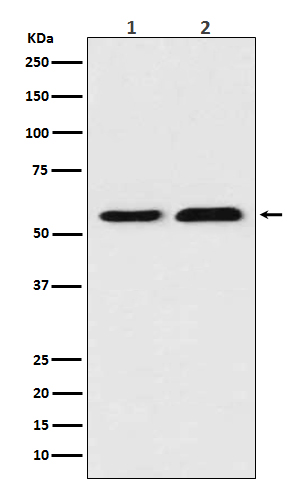产品名称
TXNRD1 (6I18) Rabbit Monoclonal Antibody
别名
GRIM12; KDRF; KM 102 derived reductase like factor; xidoreductase; Thioredoxin reductase 1; TR1; TRXR1; TXNR; TXNRD1
纯度
Affinity-chromatography
存储缓冲液
Rabbit IgG in phosphate buffered saline , pH 7.4, 150mM NaCl, 0.02% New type preservative N and 50% glycerol. Store at +4°C short term. Store at -20°C long term. Avoid freeze / thaw cycle.
Human Swissprot No.
Q16881
注意事项
TXNRD1 Antibody is for research use only and not for use in diagnostic or therapeutic procedures.
组织表达
Isoform 1 is expressed predominantly in Leydig cells (at protein level). Also expressed in ovary, spleen, heart, liver, kidney and pancreas and in a number of cancer cell lines Isoform 4 is widely expressed with highest levels in kidney, testis, uterus, ovary, prostate, placenta and fetal liver
细胞定位
Cytoplasm. [Isoform 5]: Cytoplasm.
功能
Isoform 1 may possess glutaredoxin activity as well as thioredoxin reductase activity and induces actin and tubulin polymerization, leading to formation of cell membrane protrusions. Isoform 4 enhances the transcriptional activity of estrogen receptors alpha and beta while isoform 5 enhances the transcriptional activity of the beta receptor only. Isoform 5 also mediates cell death induced by a combination of interferon-beta and retinoic acid.

